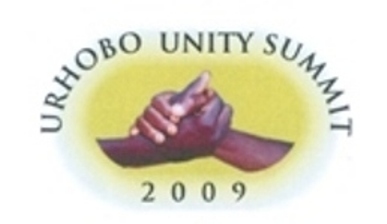
URHOBO UNITY
July 30 and 31, 2009
Conference Centre, Petroleum Training Institute,
Effurun ,
Nigeria
--------------------------------------
Opening Session
A Welcome Address by Olorogun Felix Ibru
President General, Urhobo Progress
Salutations
On behalf of the entire Urhobo people, I am delighted to welcome you
all to this unique assembly of the Urhobo People and their especially
invited guests. Although the Urhobo People do meet in annual
Congresses of Urhobo Progress Union to consider matters affecting
their common welfare, this particular gathering is distinct and indeed
rare.
First, we have invited delegates from a broad spectrum of the Urhobo
population, in the Urhobo homeland and from far and wide in the Urhobo
Diaspora.
Secondly, the issues that we consider in this
Thirdly, we have invited to this opening session of our
We will have ample opportunity to speak to the Urhobo People on the
first two of these matters in later sessions of this
Permit me to begin this exercise by paying tributes to our pioneers
who began this tradition of deliberative assemblage of Urhobo leaders
of thought. They were often summoned by their Presidents-General and
other chieftains of Urhobo Progress Union to gather together in order
to solve the challenges facing the Urhobo people. In the first four
decades of British colonial rule of
In convening this first major
However, we are here not only to pay tributes to our ancestors for
the achievements of the Urhobo past. We are here also because there
are new challenges facing the Urhobo people. We are here to design new
solutions for the slippery problems of the 21st century. In
this regard, we can borrow a shred of wisdom from Chief Mukoro Mowoe
and the other pioneers of the Urhobo past. They foresaw clearly that
Urhobo progress required the friendship of our ethnic neighbours in
the Niger Delta and the Nigerian community of ethnic nationalities. As
the representative of
Indeed, among Nigerian ethnic nationalities, Urhobo is second to none
in promoting and forging bonds of friendship with other peoples of the
Niger Delta and
Itsekiri.
Itsekiri lies to the west of Urhoboland. Placed in the Atlantic coast,
the Itsekiri have had special relations with hinterland Urhoboland for
centuries. During the age of European trade, the Urhobo people relied
on Itsekiri as an avenue for securing industrial goods from
Ijaw. Ijaw lies to Urhoboland�s southwest in the Atlantic coast and in
the creeks of the Niger Delta. The Ijaw have been in Urhobo folk
imagination from immemorial times. They are widely regarded by Urhobos
as faithful friends and allies. Economic ties, featuring food supplies
to the Ijaw and supply of fish products to the Urhobo, are old and
continue to this day. There is an ample Urhobo population of economic
migrants in Ijaw lands, consisting of fishermen, gin-makers, and
palm-nut collectors. On the other hand, there is a strong Ijaw
presence in Urhobo cities and towns. Inter-marriages between Ijaws and
Urhobos are common, resulting in numerous Ijaw families with Urhobo
members. The extensive boundaries between Urhoboland and Ijawland have
largely been peaceful. We are proud to say that Ijaw-Urhobo relations
are a true model of cordial ethnic relations.
Ukwuani. The ancient lands of the Ukwuani people lie to the northeast of
Urhoboland. Economic and commercial ties between Urhobo communities
and the Ukwuani people are ancient and well-ordered. For centuries,
Ukwuani maidens were favourite brides in Urhobo culture. These
marriages have created firm bonds and peaceful co-existence between
Urhobos and Ukwuanis. Such Ukwuani towns as Ubiaruku and such Urhobo
towns as Abraka have been shared by the two neighbours in peace. We
salute the Ukwuani people for their good disposition towards the
Urhobo people.
Isoko. Isoko lies to the southeast of Urhoboland. There are many Isoko and
there are many Urhobo who would resent the idea that Isoko is being
treated as Urhobo�s ethnic neighbour. This is because the distinction
between Urhobo and Isoko is more political than cultural. In all other
respects outside of politics, the Urhobo and Isoko share a common
culture, a common economy, and even a common history. In modern times,
the Isoko have become the most influential economic force in the
Urhobo city of
We have narrated these relationships between the Urhobo People and
our immediate neighbours in the
These principles have also governed Urhobo�s relationships with other
peoples outside the Niger Delta. Urhobo have lived and prospered in
several corners of
Urhobo cities and towns have also received many other Nigerians into
their midst. We trust that we have given to others in the measure in
which we have received from the Nigerian community.
We believe that our future development will rely on harmony between
the Urhobo people and other ethnic nationalities of the Niger Delta
and
I wish to thank you all for accepting our invitation to this unique
Permit to thank especially the esteemed Governors of the Niger Delta,
both those who have come in person and those who have sent their
representatives. We thank Your Excellency
Rt. Hon. Adams
Oshiomhole, Governor of Edo State, for your presence and friendship.
Please convey our warm greetings to the Omo N�Oba and the great people
of
I want to reserve a special word of thanks to our Guest of
Honour, Your Excellency, Rt.
Hon. Dr. Emmanuel Uduaghan, Governor of Delta State. We appreciate
your co-operation in organising this
Permit me to extend especial words of gratitude and thanks to the
officials of cultural organizations which have graced this assembly.
They represent millions of Nigerians. We trust that they would have
acquired a better understanding by of the Urhobo people by attending
this
To all our guests, particularly our immediate neighbours, let me say
the following: Please make sure that you make individual Urhobo
friends before you leave town. I say to all Urhobos, please regard all
our guests as brothers and sisters.
May God Bless
Olorogun Felix Ovuodoroye Ibru
President-General, Urhobo Progress
July 30, 2009
RETURN TO CONTENTS |
RETURN TO URHOBO UNITY SUMMIT PAGE